One Was Stubbron (9 page)

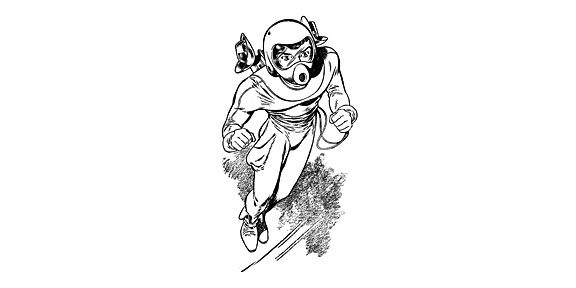
Story Preview
N
OW
that
you've just ventured through some of the captivating tales in the Stories from the
Golden Age collection by L. Ron Hubbard, turn the page and enjoy a preview of
The Great Secret.
Join Fanner Marston, a man whose
greed and lust for power drives him through a blistering desert to the legendary
city of Parva, where a secret awaits which will give him absolute control over all
the universe.
The Great Secret
S
WEEPING
clouds shadowed the tawny plain, and far off in the east the plumes of night spread gently, mournfully, burying the corpse of the Livian day. Fanner Marston, a tattered speck upon a ridge, looked eastward, looked to the glory he sought and beheld it.
Throat and tongue swollen with thirst, green eyes blazing now with new ecstasy, he knew he had it. He would gain it, would realize that heady height upon which he had elected to stand. Before him lay the Great Secret! The Secret which had made a dead race rule the Universe! And that Secret would be his, Fanner Marston's, and Fanner Marston would be the ruler, the new ruler, the arbiter of destiny for all the Universe!
All through these weeks he had stumbled over the gutted plains toward these blue mountains beneath the scorching double sun. He had suffered agonies but he had won!
There, glittering in the yellow sunlight was Parva, dead, beautiful city of the ancients, city of the blessed, city of knowledge and power.
Fanner laughed. He was strong; he was lean; but he was not handsome; and of all the things about him this laugh, distorted by thirst-ravaged lips, was the least pleasant. His eyes, which had of late grown so very dull, flamed greenly with the ecstasy which came with that vision.
He had won. They had told him that he could not; the legends said it was not possible for any mortal man to win. But the spell of the ancients was broken, their books were open, their riches lay for the taking. Parva was there! Parva was his!
It mattered nothing to Fanner that nearly twenty miles of gashed and forbidding terrain still lay between him and his goal. It mattered not that his canteens were empty; nor did it matter that, behind the ridge on which he stood, his monocycle, last vehicle of his caravan, was a ruined wreck.
He was glad now that his companions were deadâof thirst, of quarrels, of disease. He would not have to murder the last of them now and so preserve to himself this incalculable thing which awaited him. Fate was shaping everything for him!
He could do these twenty miles by noon of the next day, do them the hard way, on foot and without water, for there was something to sustain him now; he knew that the city was real, had truly existed through all these ages, was just as the history books had said it was. And if this much was true, then all was true. And he had seen the silver river!
F
anner's boots were scuffed relics but he set forth down the rocky slope and so great was his ecstasy that he did not feel the sharp bites of the rocks, nor did he feel the fingers of thirst which were throttling him. He was hard; he could outlive forty men and had done it; he would succeed, for he was Fanner Marston!
He had fought these deserts and mountains and he had whipped themâalmost. He would live through to the end, and see the Great Secret which awaited him emblazon his name throughout space!
Fanner Marston would bring a new era, a day when spaceships no longer had to land in seas to save themselves from being shattered, when men would be hampered no longer in combating the atmospheres of many now uninhabitable planets. The wealth of the Universe would be his for the taking; the entire race of mankind would bow to his command like
vassals
. For there, glittering in the sunset, was ParvaâParva, the city of the Great Secret.
Darkness caught him, and he groped his stumbling way among a great forest of black boulders. He did not mind the shocks of falling, the cuts inflicted upon him, the gouges of the unkind earth; nor did he mind the constantly increasing size of his tongue. Distance he had mastered; mere thirst would not stop him now. And besides, he had seen it, just like in the legends. The silver river. What cared he for thirst when that mighty stream awaited him?
Fanner Marston, master of the Universe: it was a pleasant title to resound through his brain.
Black-mouthed with thirst, stumbling with fatigue, lightheaded with his dream of power, he struggled on through the night.
To find out more about
The Great Secret
and how you can obtain your copy, go to
www.goldenagestories.com
.
L. Ron Hubbard in the
Golden Age of
Pulp Fiction
Â
I
n writing an adventure story
a writer has to know that he is adventuring
for a lot of people who cannot.
The writer has to take them here and there
about the globe and show them
excitement and love and realism.
As long as that writer is living the part of an
adventurer when he is hammering
the keys, he is succeeding with his story.
Adventuring is a state of mind.
If you adventure through life, you have a
good chance to be a success on paper.
Adventure doesn't mean globe-trotting,
exactly, and it doesn't mean great deeds.
Adventuring is like art.
You have to live it to make it real.
â L. Ron Hubbard
L. Ron Hubbard
and American
Pulp Fiction
B
ORN
March 13, 1911, L. Ron Hubbard lived a life at least as expansive as the stories with which he enthralled a hundred million readers through a fifty-year career.
Originally hailing from Tilden, Nebraska, he spent his formative years in a classically rugged Montana, replete with the cowpunchers, lawmen and desperadoes who would later people his Wild West adventures. And lest anyone imagine those adventures were drawn from vicarious experience, he was not only breaking broncs at a tender age, he was also among the few whites ever admitted into Blackfoot society as a bona fide blood brother. While if only to round out an otherwise rough and tumble youth, his mother was that rarity of her timeâa thoroughly educated womanâwho introduced her son to the classics of Occidental literature even before his seventh birthday.
But as any dedicated L. Ron Hubbard reader will attest, his world extended far beyond Montana. In point of fact, and as the son of a United States naval officer, by the age of eighteen he had traveled over a quarter of a million miles. Included therein were three Pacific crossings to a then still mysterious Asia, where he ran with the likes of Her British Majesty's agent-in-place for North China, and the last in the line of Royal Magicians from the court of Kublai Khan. For the record, L. Ron Hubbard was also among the first Westerners to gain admittance to forbidden Tibetan monasteries below Manchuria, and his photographs of China's Great Wall long graced American geography texts.
Upon his return to the United States and a hasty completion of his interrupted high school education, the young Ron Hubbard entered George Washington University. There, as fans of his aerial adventures may have heard, he earned his wings as a pioneering barnstormer at the dawn of American aviation. He also earned a place in free-flight record books for the longest sustained flight above Chicago. Moreover, as a roving reporter for
Sportsman Pilot
(featuring his first professionally penned articles), he further helped inspire a generation of pilots who would take America to world airpower.
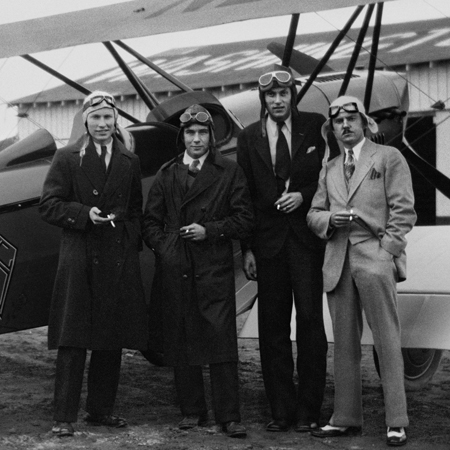
L. Ron Hubbard, left, at Congressional Airport, Washington, DC, 1931, with members of George Washington University flying club.
Immediately beyond his sophomore year, Ron embarked on the first of his famed ethnological expeditions, initially to then untrammeled Caribbean shores (descriptions of which would later fill a whole series of West Indies mystery-thrillers). That the Puerto Rican interior would also figure into the future of Ron Hubbard stories was likewise no accident. For in addition to cultural studies of the island, a 1932â33 LRH expedition is rightly remembered as conducting the first complete mineralogical survey of a Puerto Rico under United States jurisdiction.
There was many another adventure along this vein: As a lifetime member of the famed Explorers Club, L. Ron Hubbard charted North Pacific waters with the first shipboard radio direction finder, and so pioneered a long-range navigation system universally employed until the late twentieth century. While not to put too fine an edge on it, he also held a rare Master Mariner's license to pilot any vessel, of any tonnage in any ocean.
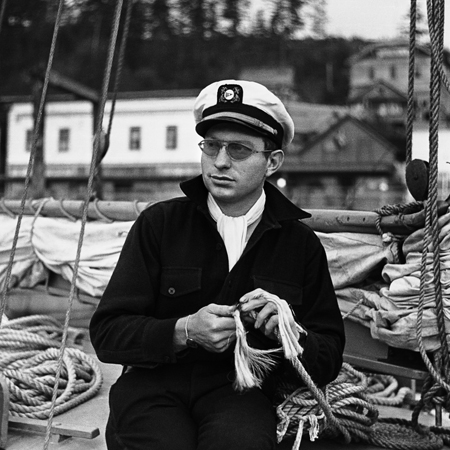
Capt. L. Ron Hubbard in Ketchikan, Alaska, 1940, on his Alaskan Radio Experimental Expedition, the first of three voyages conducted under the Explorers Club Flag.
Yet lest we stray too far afield, there is an LRH note at this juncture in his saga, and it reads in part:
“I started out writing for the pulps, writing the best I knew, writing for every mag on the stands, slanting as well as I could.”
To which one might add: His earliest submissions date from the summer of 1934, and included tales drawn from true-to-life Asian adventures, with characters roughly modeled on British/American intelligence operatives he had known in Shanghai. His early Westerns were similarly peppered with details drawn from personal experience. Although therein lay a first hard lesson from the often cruel world of the pulps. His first Westerns were soundly rejected as lacking the authenticity of a Max Brand yarn (a particularly frustrating comment given L. Ron Hubbard's Westerns came straight from his Montana homeland, while Max Brand was a mediocre New York poet named Frederick Schiller Faust, who turned out implausible six-shooter tales from the terrace of an Italian villa).
Nevertheless, and needless to say, L. Ron Hubbard persevered and soon earned a reputation as among the most publishable names in pulp fiction, with a ninety percent placement rate of first-draft manuscripts. He was also among the most prolific, averaging between seventy and a hundred thousand words a month. Hence the rumors that L. Ron Hubbard had redesigned a typewriter for faster keyboard action and pounded out manuscripts on a continuous roll of butcher paper to save the precious seconds it took to insert a single sheet of paper into manual typewriters of the day.
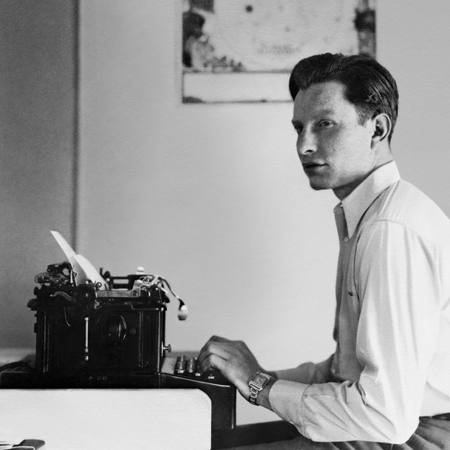
L. Ron Hubbard, circa 1930, at the outset of a literary career that would span half a century.
That all L. Ron Hubbard stories did not run beneath said byline is yet another aspect of pulp fiction lore. That is, as publishers periodically rejected manuscripts from top-drawer authors if only to avoid paying top dollar, L. Ron Hubbard and company just as frequently replied with submissions under various pseudonyms. In Ron's case, the list included: Rene Lafayette, Captain Charles Gordon, Lt. Scott Morgan and the notorious Kurt von Rachenâsupposedly on the lam for a murder rap, while hammering out two-fisted prose in Argentina. The point: While L. Ron Hubbard as Ken Martin spun stories of Southeast Asian intrigue, LRH as Barry Randolph authored tales of romance on the Western rangeâwhich, stretching between a dozen genres is how he came to stand among the two hundred elite authors providing close to a million tales through the glory days of American Pulp Fiction.

A Man of Many Names
Between 1934 and 1950, L. Ron Hubbard authored more than fifteen million words of fiction in more than two hundred classic publications.
To supply his fans and editors with stories across an array of genres and pulp titles, he adopted fifteen pseudonyms in addition to his already renowned L. Ron Hubbard byline.
______
Winchester Remington Colt
Lt. Jonathan Daly
Capt. Charles Gordon
Capt. L. Ron Hubbard
Bernard Hubbel
Michael Keith
Rene Lafayette
Legionnaire 148
Legionnaire 14830
Ken Martin
Scott Morgan
Lt. Scott Morgan
Kurt von Rachen
Barry Randolph
Capt. Humbert Reynolds

In evidence of exactly that, by 1936 L. Ron Hubbard was literally leading pulp fiction's elite as president of New York's American Fiction Guild. Members included a veritable pulp hall of fame: Lester “Doc Savage” Dent, Walter “The Shadow” Gibson, and the legendary Dashiell Hammettâto cite but a few.
Also in evidence of just where L. Ron Hubbard stood within his first two years on the American pulp circuit: By the spring of 1937, he was ensconced in Hollywood, adopting a Caribbean thriller for Columbia Pictures, remembered today as
The Secret of Treasure Island.
Comprising fifteen thirty-minute episodes, the L. Ron Hubbard screenplay led to the most profitable matinée serial in Hollywood history. In accord with Hollywood culture, he was thereafter continually called upon to rewrite/doctor scriptsâmost famously for long-time friend and fellow adventurer Clark Gable.
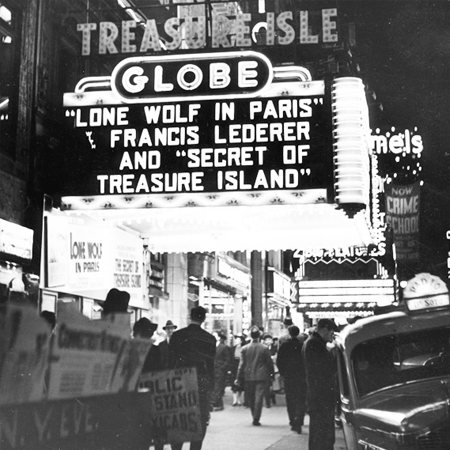
The 1937
Secret of Treasure Island,
a fifteen-episode serial adapted for the screen by L. Ron Hubbard from his novel,
Murder at Pirate Castle
.
In the interimâand herein lies another distinctive chapter of the L. Ron Hubbard storyâhe continually worked to open Pulp Kingdom gates to up-and-coming authors. Or, for that matter, anyone who wished to write. It was a fairly unconventional stance, as markets were already thin and competition razor sharp. But the fact remains, it was an L. Ron Hubbard hallmark that he vehemently lobbied on behalf of young authorsâregularly supplying instructional articles to trade journals, guest-lecturing to short story classes at George Washington University and Harvard, and even founding his own creative writing competition. It was established in 1940, dubbed the Golden Pen, and guaranteed winners both New York representation and publication in
Argosy.